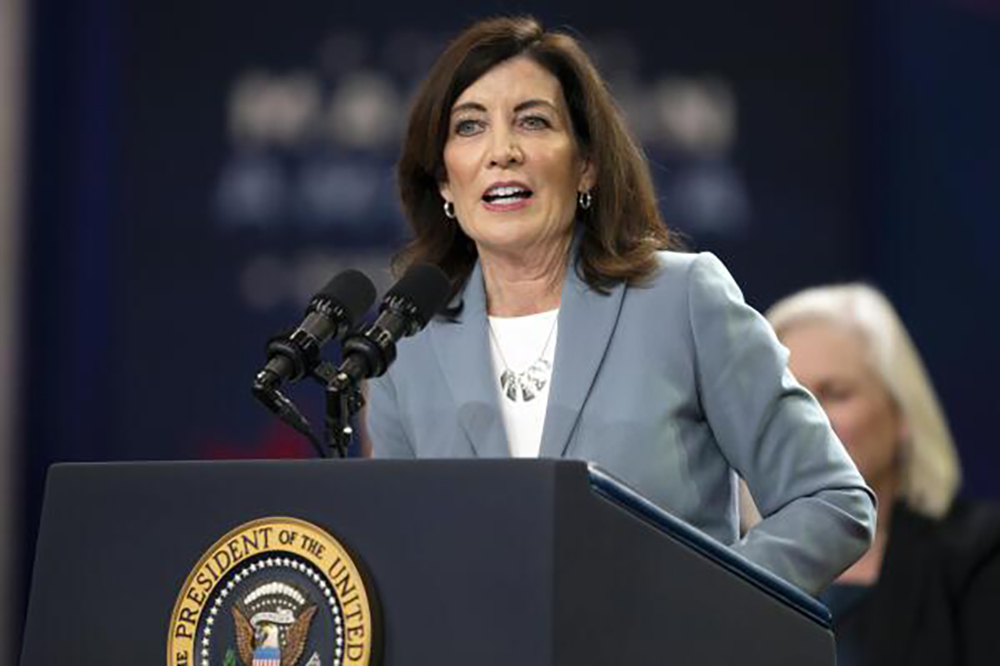|
Getting your Trinity Audio player ready...
|
By: Meyer Wolfsheim
GKathy Hochul’s controversial decision to allocate taxpayer funds for a new stadium for the Buffalo Bills has sparked fresh outrage after the NFL team’s billionaire owners turned a significant profit by selling minority stakes. The New York Post exclusively reported the details, shedding light on the financial gains of the Pegula family while taxpayers shoulder a significant portion of the stadium’s cost.
Hochul, a Buffalo native, announced in 2022 that the state would provide $600 million for the construction of a new stadium, with Erie County contributing an additional $250 million. The project, a 62,000-seat venue named Highmark Stadium, is set to replace the existing facility in the Buffalo suburb of Orchard Park by 2026. The deal was struck after Bills owner Terry Pegula threatened to move the franchise out of Western New York, potentially to Austin, Texas.
Critics have labeled the arrangement a “Buffalo boondoggle,” arguing that while the new stadium has helped boost the team’s value by over $2 billion, taxpayers will see little to no return on their investment. Dr. Mark Rosentraub, director of the Center for Sports Venues at the University of Michigan, slammed the deal as shortsighted.
“This was an egregious deal. There is no other way around it,” Rosentraub told The Post. “If the stadium had been built in downtown Buffalo, it might have spurred economic growth. Instead, they’re just replicating what they had in the same location.”
Hochul’s office defended the deal, emphasizing that state funding accounts for less than 30% of the stadium’s total $2.1 billion cost, a smaller percentage than most recent NFL stadium projects. A spokesperson claimed the project would inject $2.1 billion into New York’s economy while keeping the Bills in Buffalo for at least another 30 years.
Still, Rosentraub argued that alternative approaches could have yielded better outcomes for taxpayers. He pointed out that public funding wasn’t necessary for the construction of recent NFL stadiums like SoFi Stadium in Los Angeles and Allegiant Stadium in Las Vegas, both of which opened in 2020 without direct government investment.
Pegula, who bought the Bills for $1.4 billion in 2014, has already reaped substantial financial rewards. This year, the NFL began allowing private equity firms to acquire minority stakes in franchises. Pegula capitalized on this policy change by selling 20% of the Bills to two groups—Arctos Partners and a consortium led by NBA legend Vince Carter—at a staggering $5.8 billion valuation.
The new stadium is expected to further enhance the team’s revenue through personal seat licenses, sponsorships, and suite sales. “Having a new stadium is a nice thing,” one investment banker told The Post. “It makes it a much more attractive investment.”
Critics, however, note the stark disparity between public costs and private profits. “Did it add 10% to the value? Yes, and that’s our tax money at work,” the banker said.
Hochul’s husband, William Hochul, previously served as a top executive at Delaware North, the Bills’ concessionaire. During a 2022 press conference, Hochul defended the agreement, stating it was designed to keep the Bills in Buffalo, create 10,000 union jobs, and stimulate economic activity across the state.
“I went into these negotiations trying to answer three questions: how long can we keep the Bills in Buffalo, how can we ensure this project benefits the hardworking men and women of Western New York, and how can we get the best deal for taxpayers?” Hochul said at the time.





